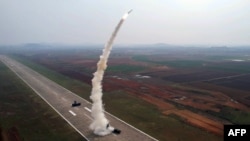On June 12, the United Nations Security Council examined the human rights situation in the Democratic People’s Republic of Korea, or North Korea, despite objections from representatives of Russia and China, who protested that the UN Human Rights council, not the UN Security Council, is the appropriate venue for such discussions.
U.S. Permanent representative to the UN, Linda Thomas-Greenfield responded that in North Korea, human rights abuses and violations are inextricably linked with the regime's threats to international peace and security.
“Nowhere is this nexus more salient than in the DPRK, where substantial evidence and documentation have directly linked the regime’s mistreatment of citizens with its investment in unlawful WMD and ballistic missile programs,” she said.
Indeed, according to the UN, the DPRK invests most of its efforts into developing its military power, ignoring the State’s responsibility to allow its people to live full lives. To finance this endeavor, the regime largely resorts to diversion of resources, including food, and forced labor. According to the UN’s Food and Agriculture Organization, nearly half of North Korea’s population is under-nourished. The regime engages in modern-day slavery, both inside the country and abroad. The state confiscates up to 90 percent of the wages of those it sends to work abroad.
“[The DPRK’s] repression and totalitarianism, proliferation and gamesmanship, makes each and every one of us less safe. And,” said Ambassador Thomas-Greenfield, “it has a profound human cost.”
“Today, the DPRK continues to deny individuals their rights to freedom of expression, thought, conscience, and religion or belief. It continues to execute, torture, arrest, and physically abuse individuals engaged in any “unauthorized” activity, including those related to religious beliefs and practices,” she said. “There are new laws and regulations enforcing repressive ideological control, further limiting freedom of expression, and cutting off access to all information outside the country.”
“It should be easy for every single one of us to condemn this unjust and inhumane activity. And yet, there are members of this Council who not only fail to speak out against this repression, but also actively embolden it,” said Ambassador Thomas-Greenfield.
“It is our responsibility, as members of this Council, as human beings, to speak out against a regime that chooses weapons over the welfare of its own people. … That is how we create a better future for the people of the DPRK, and a safer future for us all.”














